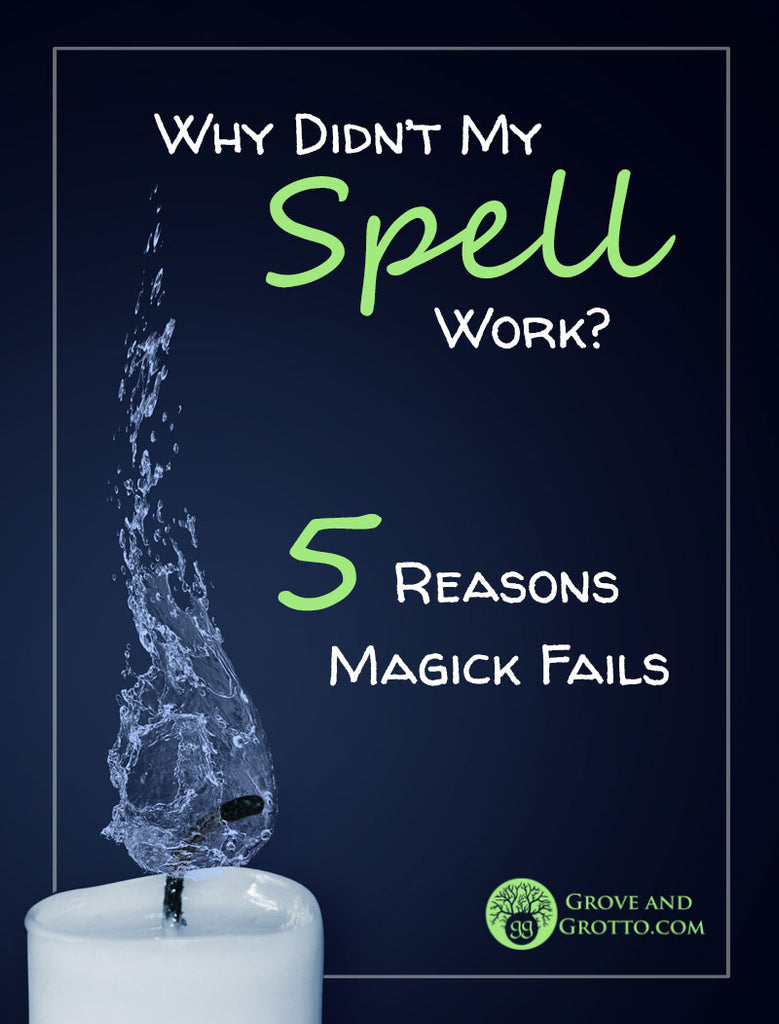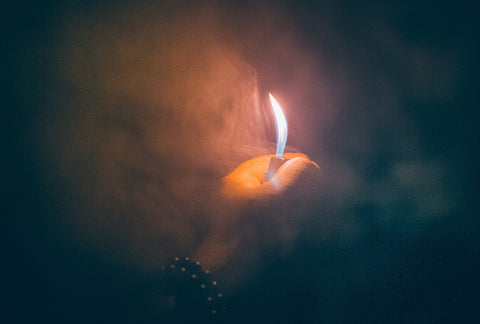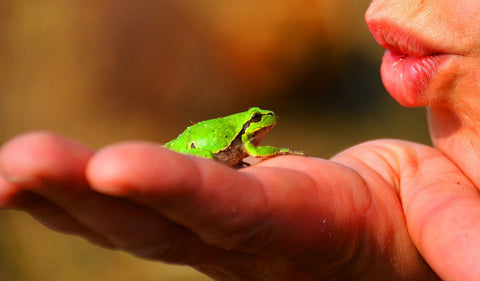
If magick worked like in the movies, we’d wave a wand, sparks would fly, and everything would fall perfectly into place. But real magick is much less predictable. Every Witch has wondered—at least once—when a spell is going to work, if it worked, or why it didn’t work.
Magick is as individual as the magician. It’s impossible to say with certainty what caused a particular spell to be a dud. Instead, I’ve assembled this list of five culprits in many failed workings. Our focus here is on spells that fizzle entirely, rather than those that backfire in tragic or comical ways. By taking a cold, hard look at what went wrong, we can become better practitioners of our Craft.

The next time your magickal efforts don’t yield the results you wanted, consider if one of these factors may have impeded your success. (And remember—if it was easy, everyone would be doing it!)
1. Unclear intention.

Most magickal flops can be filed under this vast, diverse heading. As George Harrison sings, “If you don't know where you're going, any road'll take you there.” Knowing the desired outcome of your spell is a critical first step—otherwise, why bother doing a spell at all?
Magickal intentions need to be clear, positively phrased, and realistic (whatever that means—see #4). It takes time and effort to meditate on what it is you’re asking for, and to express it concisely. If your stated intention is murky, convoluted, or not exactly what you need, then the results of your spell will likely follow the same pattern. Garbage in, garbage out.
Intention is the common ingredient of every spell. And yet, it’s amazing how many written spells never mention it. It’s like how cookbooks don’t usually tell you that you need to turn on the stove—you’re supposed to figure that out on your own.
Formulating intentions is one of the most important skills in magick. (In fact, many people would say it is the core of magick.) To know your intention is to know yourself. It’s a tall order—don’t be surprised if it trips you up now and then.
2. Lack of concentration.

Nobody knows exactly how magick works (because it’s magick), but most theorists agree on the basic elements of a successful spell. Chief among them is intense desire combined with intense concentration.
Ritual magick aims to propel you into a heightened state of consciousness where reality is more malleable. Common sense takes a backseat and your most powerful, primal essence is at the wheel. That’s why so many magickal paths use trance-inducing activities: Sex, dancing, chanting, intense smells and sounds.
So…maybe you just didn’t get there (wherever there is). You said the words, you did the things, but the most magickal parts of yourself weren’t on board. Blah energy (combined with mental noise) is a sure way to produce a spell that is dead on arrival.
3. Unsuitable substitutions.

Black candle, elderberries…hmmm, I don’t have either one of those things. Can I just use my black flashlight and some Craisins instead?
Everybody knows that energy and intention are much important than all the tools and toys in the Witch’s cabinet. And yet, colors, plants, gems, and other objects do contribute their unique powers to the success of a spell. Some magickal materials don’t have an exact substitute. That’s why we use them!
To use another kitchen metaphor, it’s a bit like baking oatmeal cookies when you don’t want to go to the store. If you’re out of cinnamon or vanilla, you can probably get away with skipping it. If you’re out of oatmeal, it’s time to try a different recipe.
Witches have been working with what they have for centuries—substitution is a time-honored practice. But too many substitutions can contaminate the energy you’re trying to assemble. Worse, half-assing a working sends a message to your unconscious that it’s just not that important. (Same goes for fudging the timing of a spell and skimping on basic preparation.) Keep your substitutions reasonable, or craft a more suitable spell based on what you have access to.
4. Asking for too much.

This is a tough one. After all, big results can only happen if you dream big. What are spells for, if not for bringing you things that seem out of reach?
But there is such a thing as an unrealistic expectation. Winning the lottery or getting a celebrity to meet you and fall in love with you are just two extreme examples of spells that are unlikely to succeed.
Magick rarely causes sudden, dramatic change. And we should all be very grateful that is the case—or else we would have a devalued currency and many, many more celebrity offspring.
Some wise teachers have described magickal action as a nudge, a bit of pressure tilting the outcome in your favor. Sometimes it’s enough, other times it isn’t. Think in terms of positive incremental change and small, meaningful victories. Once you achieve one objective, keep your sights on the next goal.
5. Other wills at work.

Christians have an explanation for why God doesn’t answer prayers: “It wasn’t His will.” It’s not that God doesn’t hear prayers or that prayer doesn’t work—it’s just that God’s will is stronger. Magickal folks have a similar understanding. Just because magick can help you to get what you want doesn’t mean it works 100 percent of the time.
If you’re not a theist, you can think of it in terms of natural laws. You can tug hard at your prize, but sometimes, another person is in a position to tug harder. Wish you could fly? All the blue jay feathers and Air invocations you can manage are unlikely to reverse the effects of gravity. As might be said about your failed working, “It isn’t meant to be.”
As Witches and Pagans, we should accept that although our will has immense power, it is always interacting with that of other beings. If your will can effect change, it’s only logical that other wills can, as well. Magick and counter-magick, fears and desires, laws of Nature, actions of humans and angels and Gods and spirits—it’s all part of the vast and swirling ecosystem that connects all the Worlds. What can you do? Gather all the information that you can about who or what got in the way, and better luck next time.
Read more articles about spellwork, or check out the archive!
